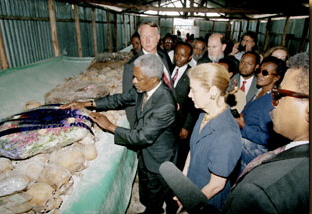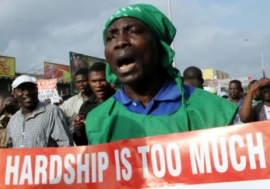The world reflects on Rwanda genocide
The world reflects on Rwanda genocide
Ten years after one of the most horrific genocides of the 20th century, Rwanda is still in the process of rebuilding its devastated society. UN Secretary-General Kofi Annan, meanwhile, is challenging the international community to take steps to avert any similar catastrophe anywhere in the world. On 7 April -- the anniversary of the start of the 1994 mass killings in Rwanda -- he will outline a UN plan of action to prevent genocide.
"There can be no more binding obligation for the international community than the prevention of genocide," Mr. Annan remarked this past February. "The events in Rwanda 10 years ago were especially shameful. The international community clearly had the capacity to prevent those events, but failed to summon the will. . . . We must ensure that we never again fail to summon the will."
 Secretary-General lays a wreath at a genocide site in Mwurire, Rwanda, during a 1998 visit.
Secretary-General lays a wreath at a genocide site in Mwurire, Rwanda, during a 1998 visit.One of the centrepieces of the plan will be appointment of a new UN special adviser on the prevention of genocide. The adviser will be mandated to collect information on situations that may lead to genocide, issue early warnings of impending disaster and make recommendations for action to the Secretary-General and the UN Security Council.
The UN action plan, which is inspired by the recommendations in 1999 of an independent commission of inquiry into the Rwanda genocide chaired by former Swedish Prime Minister Ingvar Carlsson, will involve the whole UN system. Many elements of such a plan have already been put into place, including reforms in the way the UN responds to armed conflicts.
Since the Rwanda genocide, the UN also has been more proactive in responding to massive human rights violations, which often are signs of a genocide-in-the-making. As Mr. Annan declared at an international forum in Stockholm on 26 January, "We must attack the roots of violence and genocide. These are intolerance, racism, tyranny and the dehumanizing public discourse that denies whole groups of people their dignity and rights. We must protect especially the rights of minorities, since they are genocide's most frequent targets."
100 days of horror
The Rwanda genocide began on 7 April 1994, a day after a plane carrying the presidents of Rwanda and Burundi was shot down as it prepared to land in Kigali, the Rwandan capital. Over the next 100 days, approximately 800,000 Rwandans were slaughtered. The genocide was highly organized, with top government and ruling party officials playing a direct role. Militia members, the armed forces and civilians carried out appalling atrocities, mainly against the Tutsi ethnic minority, but also against those from the Hutu majority who refused to join in the slaughter or belonged to opposition parties.
The genocide was perpetrated in full view of the international community. A peacekeeping operation -- the UN Assistance Mission in Rwanda (UNAMIR) -- was on the ground, with about 2,000 troops, originally sent to monitor implementation of an August 1993 peace agreement between the government and rebel forces of the Uganda-based Rwanda Patriotic Front (RPF).
After the genocide began, 10 Belgian peacekeepers were killed trying to defend Prime Minister Agathe Uwilingiyimana, who also was slain. The then UN Secretary-General Boutros Boutros-Ghali approached the Security Council with three options: reinforce UNAMIR, scale it down or withdraw it entirely. The Security Council voted to reduce the force from 2,000 to 270. Only in mid-May did the Council reverse the decision and vote to dispatch some 5,500 UN troops. Few arrived before the massacres ended in July, when the Tutsi-dominated RPF took power.
The Carlsson Commission report later concluded: "The responsibility for the failings of the United Nations to prevent and stop the genocide in Rwanda lies with a number of actors, in particular the Secretary-General, the [UN] Secretariat, the Security Council, UNAMIR and the broader membership of the United Nations."
On the day the report was released, Mr. Annan -- who headed UN peacekeeping at the time of the genocide -- said: "All of us must bitterly regret that we did not do more to prevent it. . . . On behalf of the United Nations, I acknowledge this failure and express my deep remorse."
Painful recovery
In Rwanda itself, the 10th anniversary will be an occasion to reflect on the genocide and the process of political and economic recovery over the past decade.
National reconciliation has been difficult, with some 80,000 genocide suspects still in prison awaiting trial. Many will be tried by local community tribunals known as gacaca, of which nearly 800 are functioning. Some 200 of the most serious cases of individuals accused of leading the genocide are being investigated or prosecuted by the UN's International Criminal Tribunal for Rwanda, which sits in Arusha, Tanzania.
In the city of Cyangugu, which was virtually deserted after some 50,000 Tutsi were killed there in 1994, Rwandans "now appreciate that they have to live together, work together and build their country as one," Cyangugu provincial Governor Musa Fazil Harerimana told the Swiss news agency Hirondelle. The town itself is reviving, with new schools, hotels and bustling markets. Abandoned tea and coffee plantations are approaching pre-1994 production levels.
According to International Monetary Fund data, Rwanda's economy rebounded significantly after the restoration of peace, averaging more than 15 per cent annual growth between 1995 and 1999, and 7.4 per cent in 2000-02, well above the average for sub-Saharan Africa as a whole.
"Today, Rwanda has much to show the world about confronting the legacy of the past and tackling the challenge of recovery," Secretary-General Annan has observed. "It is demonstrating that it is possible to reach beyond tragedy and rekindle hope."























